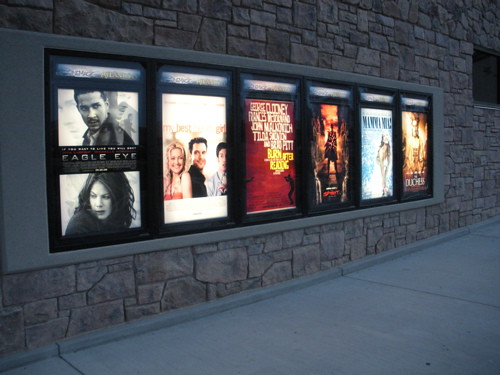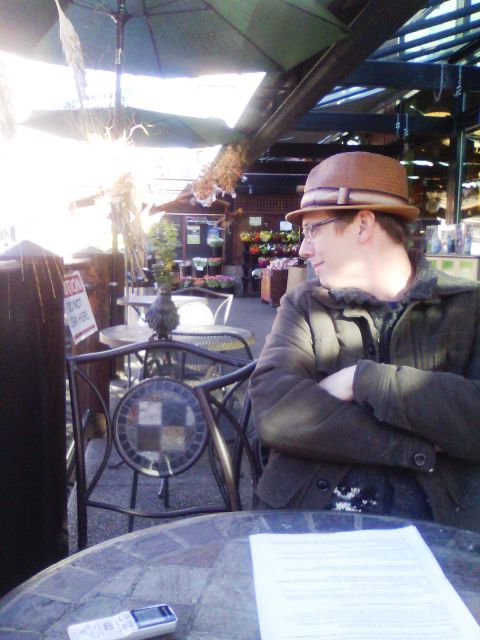I was fortunate enough to meet Craig Hall, Rumble Productions‘ Artistic Producer and soon to be Vertigo Theatre’s Artistic Director, this past week. Craig is producing his last show in Vancouver before heading for Calgary, a favourite play of his called Snowman by Greg MacArthur. We had our interview on his lunch break from rehearsals, during which I learned a lot about theatre, the creative process and Snowman. I am honoured to have shared the following exchange with him — the lines in bold are my questions and the chunks of elegant prose are his answers. This is the first post in a 3-part Series on my conversation with Craig Hall.

What is it about a play that makes you want to produce it?
I think that’s a really hard thing to put a finger on. Sometimes a play is good for a company, because it just fits perfectly with their mandate, or it’ll be a really great audience draw, but sometimes a play is just really right for you as an artist … I think you just know. You start right away with your own tastes — I don’t think I’d ever program anything that I really hate. But having said that my tastes are pretty wide, I don’t like just one particular kind of work. That’s why at Rumble over the years I’ve kept the ideas very broad, because I don’t want to do just physical-based theatre or just one type of theatre — I like all sorts of theatre.
What are some of your favourite plays?
Well actually Snowman is one of my favourite Canadian plays that I’ve come across over the last ten years, which is why I’m coming back to it again after all this time. My tastes tend to be slightly dark, tending towards the dark comedies. There was a show they just did at the Shaw Festival called When the Rain Stops Falling by the Australian writer Andrew Bovell. It was kind’ve dark and I actually really like filmic stuff like that on stage.
On that note, I’ve heard some in theatre sound slightly bitter about ours being a ‘going-to-the-movies’ culture. What are your thoughts about that attitude?
I think people say that for different reasons. I think there is a reaction to theatre that is perceived as ‘sitcoms on stage’ or movie melodrama on stage, where it’s like you could put the play up on a screen and it would be the same. But I like the challenge of having things on stage which have a really broad scope, and like a hundred locations, and where you can be really conceptual with how you approach them.

In a show like When the Rain Stops Falling or a couple of shows of this Scottish writer David Greig, one called San Diego and another called (it’s a long one) A Cosmonaut’s Last Message to a Woman He Once Loved in the Former Soviet Union, they go through time and space. One minute you’ll be in the now and then you’ll be in fifteen years from now. I love the challenge of having to take an audience on that journey in one small black box or stage, just through simple stage magic and ideas — being able to transport people that way is really exciting. I’m drawn much more to that sort of play than to a play that takes place in the drawing room of an old English country house and stays there. I think [in the former] you have much more free range of storytelling and a much fuller range in the theatricality of it.
Are there some films or filmic plays that you like?
I think the plays I just mentioned and Snowman are very filmic plays and in a different way. Greg’s writing style is very direct address, the actors on stage talk directly to the audience. There’s sort of a hindsight quality to them, almost like a documentarian has come across these people after the events and started asking them what happened. They basically start to tell the story of what happened. Very often they’re talking directly to you and then suddenly they’re in the past, actively entrenched in the story, but then they’ll pop right back out again. The layers and layers of registers is what’s really challenging about the piece.

It’s funny, when I first did Snowman back in 2003, there was no context for this style, this direct address style was very new. It was not to everybody’s taste, because a lot of people liked to have that veil, that fourth wall comes down and you just sit back and watch things unfold. They didn’t like to be talked to, but I loved it. But now, doing this play in 2011, we have TV shows like The Office and Modern Family where there’s this strange mockumentary thing, where characters are doing exactly that and talking to the camera. So in some ways it kind of makes our job a little more challenging, because people understand that convention now, and and in some ways it makes them complacent with it. But it also helps because the audience knows what this is now, and they are able to sit back and be okay with it.
What motivates you to do the work that you do? What does it do for you personally and what do you think that it’s doing in the world?
That’s a good question. I’ve always struggled with that question, because there are other artists out there that have a real agenda in what they’re doing. They’re out to change the way people think or change the world or at the very least to shed light on something. I’ve never been motivated that way, I just really like stories. I read a lot of stories, I write stories occasionally, I love movies, I love to be entertained. It’s not that I don’t think there are poignant things to be said, but often that stuff is secondary to just wanting to either hear or tell really great story.
Craig Hall’s last production for the time-being in Vancouver, Greg MacArthur’s Snowman, opens this week and runs from November 4th – 19th, 2011 at the Arts Club Revue Stage on Granville Island.






[…] for Calgary, a favourite play of his called Snowman by Greg MacArthur. This is Part 2 of that interview, focused on discussing the theatrical phenomena of Hive and the Fourth Wall of the […]